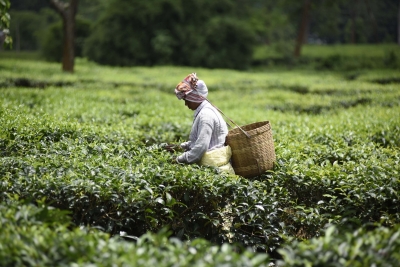Tea business all set to return in Doon valley
By IANS | Published: March 3, 2021 12:40 PM2021-03-03T12:40:03+5:302021-03-03T12:55:24+5:30
Dehradun, March 3 In the vast expanses of the Harbanswala tea garden in the Doon valley, the greenery ...

Tea business all set to return in Doon valley
Dehradun, March 3 In the vast expanses of the Harbanswala tea garden in the Doon valley, the greenery has almost returned. The nearby Arcadia tea garden is also gearing up for a green look, though the process may take a year or two, tea workers say.
DTC India, which owns the two tea gardens spread in an area of 1,127 acres, claims it is trying to rejuvenate tea leaves by planting fresh saplings to give boost to its loss-making tea business. Looking for break-even in 4-5 years, the company has already set up its own nursery and bought 15,000 saplings from Siliguri in West Bengal.
"The tea business is going to stay in Arcadia and Harbanswala. We have no other plan," said D.K. Singh, Director of the DTC India, 74 per cent of stakes of which are being held by a Delhi-based real estate company Logical Buidwell.
For the fertilisation purpose, DTC India, a delisted company, has also built its own gigantic 3.5 lakh litre waste composter.
"We are making our best efforts to produce tea leaves of high quality," said Singh.
The company is currently producing 8,000-10,000 kg of green tea. Efforts are on to find a suitable brand also.
After the plucking and the processing, tea leaves are sent to Amritsar which has now become a new destination for tea business. From Amritsar, tea bags are being sent to different areas of the country.
There had been attempts to export tea bags to Japan and other nations directly but there was no success due to financial crunch faced by the company.
The tea season normally begins after the month of March when tea leaves start rejuvenating. The plucking goes one till October-November. During the past one or two decades, the tea business has taken a beating mainly due to the poor maintenance of the gardens as well as the climatic changes that are occurring in the Doon valley which is fast losing its forest cover. You often see cattle grazing in the tea gardens. Scores of unauthorised colonies which have come up on the fringes are posing threats on the gardens. Widespread weed is also destroying the tea cultivation.
Few years ago, the government made roads inside the Aracadia tea garden under the local political pressure. Two decades ago, the Indian Military Academy (IMA), a training centre for the army cadets, was given a big chunk of Arcadia land which in turn considerably shrunk the tea cultivation area. There are reports that the IMA wants to acquire more land of the tea gardens now.
During the British period, the situation was different. Hem Bahadur, who has been working since 1950s, says the British officials had big plans. The British officials brought tea saplings from China and Assam to Dehradun nearly 150 years ago and set up 40 to 45 tea gardens. And the first tea company was set up in 1860 in the name of North West Tea Frontier Company. That was the period when the British rulers planted tea at several areas in India like Kangra, Darjeeling and Assam. Three years later in 1863, the company was renamed as Dehradun Tea Company. When British people were leaving India, the ownership of these gardens came in the hands of some Ind.And now, only four to five tea gardens are left in the Doon valley and the company's fortunes have also taken a nosedive.
"Lot of things happened since 1950s when the British people left and the company came into the hands of local people. But when the IMA acquired the land, the company's losses started growing," said Rai Chand, a tea worker.
From 5,000 acres, the gardens have been reduced to only 1,127 acres during the past 150 years.
There are still nearly 100 workers in the tea gardens.
There had been attempts to change the land use of the two gardens apparently for better business prospects in the past.
"There is no truth in these reports. These are all rumours," said D.K. Singh.
But the move to rejuvenate the two tea gardens is a step welcomed in Uttarakhand.
"We welcome any move that brings greenery in these gardens," said Anil P. Joshi, an environmentalist who was also awarded Padam Bhushan last year.
Dehradun used to be known for the cultivation of tea, basmati rice, litchi and lime, but rapid urbanisation powered by thriving real estate business has turned out to be a death-knell.
"Dehradun has lost its green cover as the city takes shape of a concrete jungle. And the majestic gardens are dying slowly," lamented joshi.
But tea workers and the mandarins are keeping hopes alive for a better tea business in near future.
"We will increase our production 5-times in the next four to five years," says Singh. That will be the time when the real results will be seen, he avers.
( With inputs from IANS )
Disclaimer: This post has been auto-published from an agency feed without any modifications to the text and has not been reviewed by an editor
Open in app